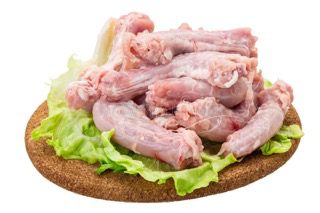

Raw chicken necks are a great source of calcium, protein, and taurine for dogs. However, it’s important to avoid cooking them as the bones can splinter and cause harm to your dog’s mouth or digestive system.
Feeding your dog chicken necks can provide numerous health benefits, including supporting muscle development, tissue repair, bone and dental health, cardiac and eye health, and a stronger immune system. They also contain glucosamine and chondroitin, which promote healthy joints. Chewing on chicken necks can also improve your dog’s dental health.
Cooked chicken neck bones can splinter and cause harm to your dog’s mouth, throat, and intestines, and can also pose a choking hazard. Overfeeding on chicken necks can lead to nutritional imbalances in your dog.
It’s best to source chicken necks from free-range and organic suppliers. They can be fed fresh or dehydrated and are often included in a raw diet for dogs. If your dog’s diet already contains enough calcium, limit the amount of edible bones or only feed them as occasional treats. Always supervise your dog when feeding them bones to prevent choking or other injuries.
Chicken necks are a common treat for dogs and can be a great source of protein and other nutrients. They are a natural source of glucosamine and chondroitin, which can help support joint health in dogs. However, it is important to note that chicken necks should always be fed raw and in moderation. Cooked chicken bones can splinter and cause choking or damage to the digestive system. Additionally, chicken necks should only be given to dogs under supervision to prevent any potential choking hazards.
In extreme cases where a dog has accidentally swallowed a chicken neck whole or is choking on a piece, it is important to seek veterinary attention immediately. If a dog is choking, it may be necessary to perform the Heimlich maneuver or CPR until veterinary care can be obtained.
Safer alternatives to chicken necks include raw carrots or apples, which can provide similar dental benefits without the risk of choking or digestive issues. Another alternative is a specially designed dental chew or toy.
If chicken necks are being fed to dogs, they can be served as a treat or added to a meal as a supplemental source of protein. However, it is important to monitor the amount given and to ensure that the dog is able to chew and digest them properly.